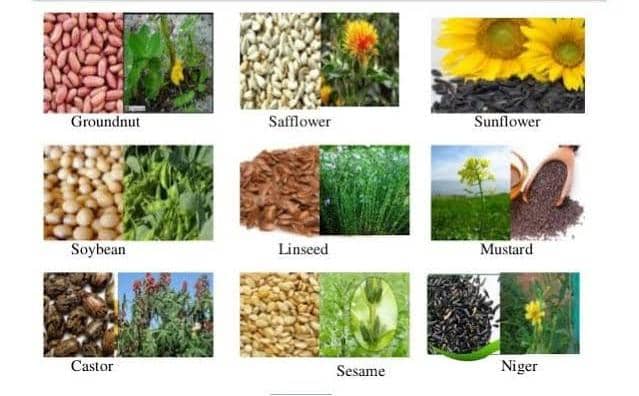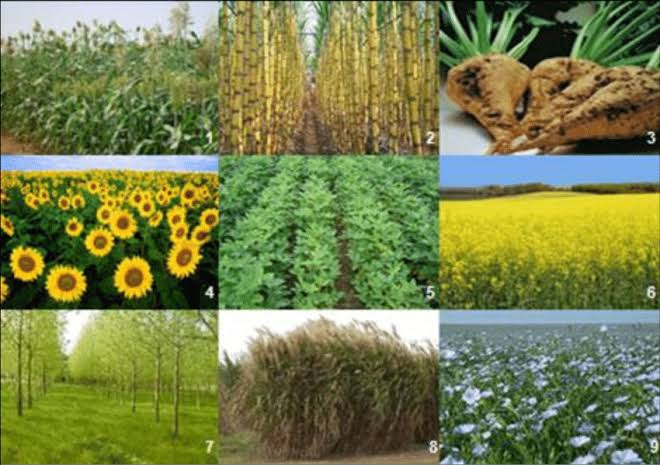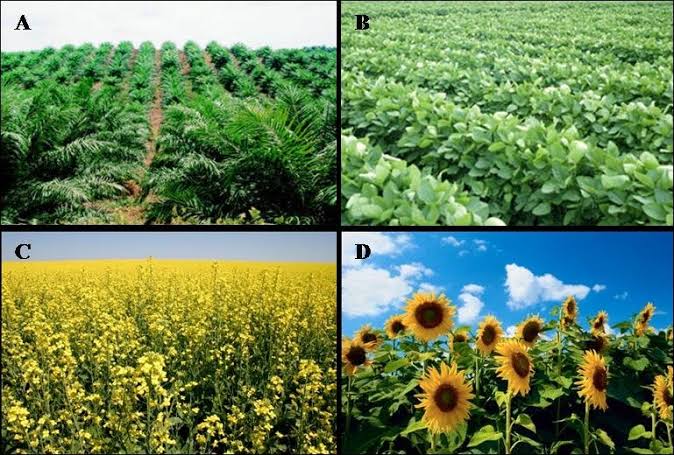Oil crops play a significant role in agriculture and the global economy, serving as essential sources of edible oils and other valuable products. These crops are specifically cultivated for their oil content, which can be extracted and refined for various culinary and industrial purposes.
They include a diverse array of plants, ranging from annual to perennial species, and their oil can be derived from seeds, fruits, or nuts. To understand what oil crops are, it is essential to recognize their primary function: the production of oil. Oil crops are cultivated for their seeds or fruits, which contain high levels of oil that can be extracted and processed.
These crops include soybeans, sunflower, canola, palm oil, and cottonseed, among others. Each type of oil crop has distinct characteristics and benefits, making them suitable for various climates and soils. For example, soybeans thrive in temperate regions, while oil palm is best suited to tropical climates.
When we define oil crops, we refer to plants specifically grown for their oil-rich seeds or fruits. The oil extracted from these crops serves multiple purposes. It can be used for cooking and food processing, as well as in the production of biodiesel, cosmetics, and various industrial products.
The versatility of oil crops makes them valuable not only for human consumption but also for their contributions to renewable energy and manufacturing sectors. This definition highlights the dual nature of oil crops, as they are integral to both dietary needs and industrial applications.
The meaning of oil crops extends beyond their agricultural significance. These crops have far-reaching implications for global trade and food security. The oil extracted from these crops is a vital component of many diets worldwide, providing essential fatty acids and nutrients.
Moreover, the cultivation of oil crops can have economic benefits for farmers and nations, as they often represent a significant source of income. In many developing countries, oil crops are a crucial aspect of agriculture, contributing to livelihoods and local economies.
The cultivation of oil crops has evolved over the years, influenced by changing consumer preferences, technological advancements, and agricultural practices. As demand for vegetable oils continues to rise, driven by population growth and changing dietary habits, the importance of oil crops has only increased.
Innovations in breeding and biotechnology have led to the development of high-yielding and pest-resistant varieties, improving production efficiency and sustainability. Additionally, the environmental impact of oil crop production has garnered attention in recent years.
Sustainable agricultural practices are essential for minimizing the negative effects associated with oil crop cultivation, such as deforestation and habitat destruction. Efforts to promote sustainable practices, including agroforestry and organic farming, are crucial in ensuring the long-term viability of oil crops while preserving ecosystems and biodiversity.
Oil crops are also subject to market dynamics and price fluctuations, influenced by factors such as global supply and demand, trade policies, and climate conditions. These crops are often traded on international markets, with major producers like the United States, Brazil, and Indonesia playing pivotal roles.
As a result, these crops can be affected by geopolitical tensions, changes in trade agreements, and shifts in consumer preferences toward healthier or more sustainable options.
Read Also: Types of Flowers
10 Examples of Oil crops and Their Uses

1. Oil palm (Elaeis guineensis): one of the most important oil crops worldwide. The oil palm tree is native to West Africa but has become a major agricultural product in countries like Malaysia and Indonesia.
Palm oil extracted from its fruit is used for cooking, margarine production, and as an ingredient in various processed foods. Additionally, palm oil is utilized in the cosmetics industry and as a biodiesel source. In Nigeria, oil palm is crucial for local economies and provides employment for many farmers.
2. Soybean (Glycine max): which is widely cultivated for its oil-rich seeds. Soybean oil is commonly used for cooking and frying due to its neutral flavor and high smoke point. Moreover, soybean meal, a byproduct of oil extraction, is an essential protein source for livestock feed.
In Nigeria, soybean farming has gained popularity, contributing to food security and economic growth. The versatility of soybeans also extends to producing tofu, soy milk, and various food products.
3. Sunflower (Helianthus annuus): is another key oil crop, particularly valued for its seeds, which are high in oil content. Sunflower oil is known for its light flavor and is used in cooking and salad dressings.
It is also a common ingredient in margarine and snack foods. Additionally, sunflower seeds are a nutritious snack and can be ground into flour. In Nigeria, sunflower cultivation has been promoted as an alternative oil crop to diversify agricultural production and reduce reliance on imported oils.
4. Rapeseed (Brassica napus): from which canola oil is derived. Canola oil is low in saturated fat and high in monounsaturated fat, making it a popular choice for health-conscious consumers.
It is commonly used in cooking, baking, and salad dressings. Rapeseed is also a significant source of biofuel and animal feed. In Nigeria, rapeseed cultivation is being explored to enhance oilseed production and improve farmers’ livelihoods.
5. Groundnut (Arachis hypogaea): also known as peanuts, is another vital oil crop. Groundnut oil is extracted from its seeds and is widely used for cooking and frying. The oil is known for its flavor and high smoke point, making it suitable for various culinary applications.
Additionally, groundnuts are rich in protein and are consumed as snacks or used in making peanut butter. In Nigeria, groundnuts are an essential cash crop, contributing significantly to the agricultural sector.
6. Cotton (Gossypium spp.): is primarily grown for its fiber but also serves as an important oil crop. Cottonseed oil is extracted from the seeds and is used in cooking and food processing.
It is often used in salad dressings and snacks due to its neutral flavor. Cottonseed oil is also utilized in cosmetics and industrial applications. In Nigeria, cotton farming plays a crucial role in the textile industry and provides oil as a byproduct.
7. Sesame (Sesamum indicum): Sesame seeds are high in oil content and are used to produce sesame oil, which has a distinctive flavor and aroma. This oil is commonly used in Asian cuisine and salad dressings.
Additionally, sesame seeds are nutritious and can be consumed as snacks or used in baking. In Nigeria, sesame farming is gaining popularity due to its high market demand and potential for export.
8. Coconut (Cocos nucifera): is a versatile oil crop known for its numerous uses. Coconut oil is extracted from the flesh of the coconut and is used for cooking, baking, and frying.
It is also popular in the cosmetics industry for its moisturizing properties. Additionally, coconut water and milk have become trendy health drinks. In Nigeria, coconut cultivation is significant, particularly in coastal regions, providing income for many farmers.
9. Flaxseed (Linum usitatissimum): is another important oil crop, known for its oil-rich seeds. Flaxseed oil is valued for its omega-3 fatty acids, making it a popular supplement for health enthusiasts.
It is commonly used in salad dressings, smoothies, and health food products. In Nigeria, flaxseed is being promoted as a potential oil crop due to its nutritional benefits and adaptability to various growing conditions.
10. Safflower (Carthamus tinctorius): is an oil crop primarily cultivated for its seeds, which yield safflower oil. This oil is known for its light flavor and high smoke point, making it suitable for frying and baking.
Safflower oil is also used in salad dressings and processed foods. Additionally, it has applications in cosmetics and pharmaceuticals. In Nigeria, safflower cultivation is being explored to diversify oilseed production and meet local oil demands.
Read Also: Flower Cultivation Techniques
Importance of Oil Crops

Oil crops are integral to global agriculture, economy, and food security. They encompass various plants cultivated primarily for their oil-rich seeds or fruits, including oil palm, soybeans, sunflowers, rapeseed, and others.
The significance of these crops extends beyond their nutritional value; they also play a crucial role in supporting livelihoods, enhancing sustainability, and addressing food security challenges. Understanding the importance of oil crops and their preservation is essential for maintaining agricultural diversity and ensuring a stable food supply.
One of the primary reasons oil crops are vital is their contribution to food production. Edible oils extracted from these crops are essential ingredients in various cuisines worldwide. They provide necessary fats and oils that contribute to human health and nutrition. For example, soybean oil is widely used for cooking and food processing, while palm oil is a staple in many tropical countries.
The ability of these crops to produce high yields of oil per acre makes them an efficient source of dietary fats, crucial for meeting the nutritional needs of a growing global population.
Furthermore, oil crops have significant economic importance. They are among the most widely traded agricultural commodities globally. Countries that produce oil crops benefit from export revenues, which contribute to national economies.
For instance, palm oil is a major export product for countries like Indonesia and Malaysia, providing income for millions of farmers and workers in the supply chain. Similarly, soybean exports play a critical role in the economies of the United States and Brazil.
The economic benefits derived from oil crops create job opportunities, support rural development, and enhance the overall standard of living for farming communities. In addition to their nutritional and economic value, oil crops contribute to environmental sustainability.
Many oil crops, such as sunflowers and soybeans, can be cultivated in diverse environments and contribute to soil health. Crop rotation and intercropping with oil crops can enhance soil fertility and reduce erosion.
These practices help maintain a balanced ecosystem and promote biodiversity, which is essential for resilient agricultural systems. Furthermore, the cultivation of oil crops can sequester carbon in the soil, mitigating climate change effects.
Preservation of oil crops is essential to ensure that future generations continue to benefit from their advantages. As the global demand for edible oils increases, maintaining the genetic diversity of oil crops becomes crucial.
Genetic diversity ensures that crops can adapt to changing environmental conditions, pests, and diseases. Efforts to preserve traditional varieties of oil crops can enhance food security by providing resilience against challenges that may arise due to climate change and other factors.
Research and development play a vital role in the preservation of oil crops. Advances in agricultural biotechnology can help improve crop yields, pest resistance, and nutritional quality. Through research, scientists can develop high-yielding and resilient oil crop varieties that can thrive in diverse conditions.
By investing in agricultural research, governments and organizations can ensure that oil crops remain productive and sustainable in the face of evolving challenges. Sustainable farming practices are crucial for the preservation of oil crops. Implementing practices such as organic farming, agroforestry, and integrated pest management can enhance the sustainability of oil crop production.
These practices promote soil health, reduce the reliance on chemical inputs, and minimize environmental impact. By adopting sustainable methods, farmers can maintain the productivity of oil crops while preserving the ecosystem and ensuring long-term viability.
Consumer awareness also plays a significant role in the importance and preservation of oil crops. As consumers become more conscious of their food choices, there is an increasing demand for sustainably produced oils.
Consumers are actively seeking out products that support ethical and environmentally friendly practices. This trend encourages farmers and producers to adopt sustainable practices that protect oil crops and their ecosystems.
Additionally, the importance of oil crops extends to their role in addressing food security challenges. As the global population continues to grow, ensuring an adequate food supply becomes paramount. Oil crops provide a stable source of calories and essential nutrients, contributing to food security in many regions.
By increasing the production of oil crops, countries can enhance their self-sufficiency and reduce dependency on imports, thereby strengthening their food systems. The development of value-added products from oil crops further enhances their importance.
By processing oil crops into various products, such as biodiesel, cooking oils, and cosmetics, producers can maximize their economic returns. The production of biodiesel from oil crops is particularly relevant in the context of renewable energy.
As the world seeks alternative energy sources, oil crops can play a significant role in reducing greenhouse gas emissions and promoting sustainable energy solutions. Moreover, the cultivation of oil crops can improve rural livelihoods. Smallholder farmers, who often cultivate oil crops, can benefit from increased income and food security.
By integrating oil crop production into their farming systems, farmers can diversify their income sources and reduce their vulnerability to market fluctuations. The economic benefits of oil crops can empower communities, providing resources for education, healthcare, and infrastructure development.
Frequently Asked Questions on the Importance and Uses of Oil Crops

1. What are oil crops?
Oil crops are plants cultivated primarily for their seeds or fruits, which contain high oil content. Common examples include soybeans, sunflowers, canola, and oil palm.
2. Why are oil crops important for food security?
Oil crops are crucial for food security as they provide a significant source of edible oils, which are essential for cooking and food preparation, contributing to the nutritional needs of populations worldwide.
3. What economic benefits do oil crops provide?
Oil crops contribute to national economies through exports, creating jobs in agriculture, processing, and distribution. They are often among the most traded agricultural commodities.
4. How do oil crops contribute to environmental sustainability?
Oil crops can enhance soil health and biodiversity when integrated into sustainable farming practices, such as crop rotation and agroforestry. They can also help sequester carbon, mitigating climate change effects.
5. What are some common uses of oil crops besides cooking oil?
Beyond cooking oil, oil crops are used in the production of biodiesel, animal feed, cosmetics, and various industrial products, enhancing their economic value.
6. How do oil crops support rural livelihoods?
Smallholder farmers growing oil crops can diversify their income sources, improve food security, and gain access to markets, contributing to community development and poverty reduction.
7. What role do oil crops play in renewable energy?
Oil crops, such as soybean and canola, are increasingly being used to produce biodiesel, a renewable energy source that can help reduce reliance on fossil fuels and lower greenhouse gas emissions.
Read Also: Mexican Spices – Complete Guide to Spike Up your Meals
Do you have any questions, suggestions, or contributions? If so, please feel free to use the comment box below to share your thoughts. We also encourage you to kindly share this information with others who might benefit from it. Since we can’t reach everyone at once, we truly appreciate your help in spreading the word. Thank you so much for your support and for sharing!

